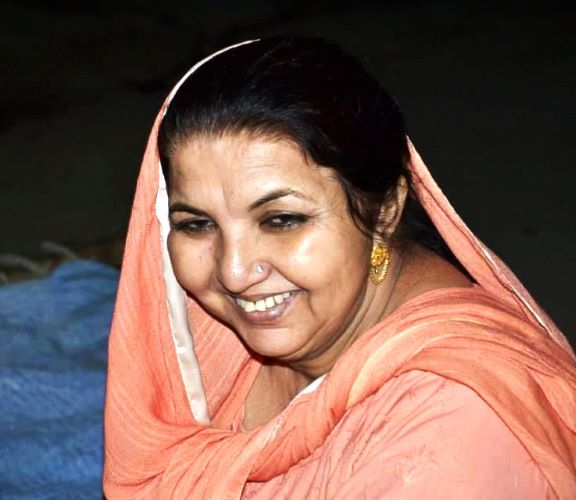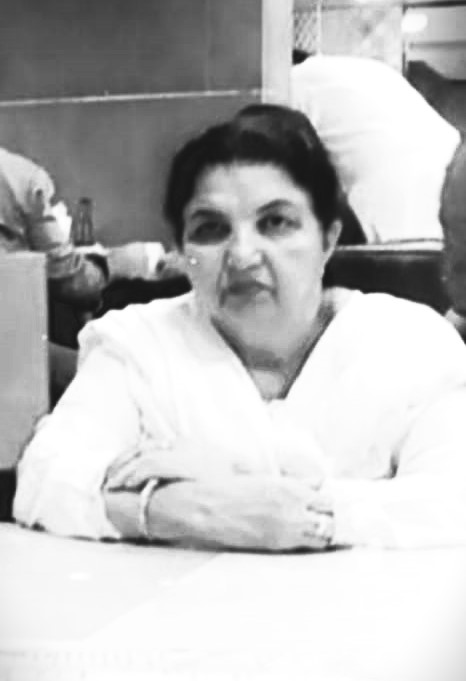
Adi Naseeba’n Mangi was tolerant, noble, merciful, and sober. No doubt, she was a truly saintly woman!
Zaffar Junejo
We all consciously or unconsciously accept death and even talk about it, but it is never taken seriously. Sometimes, it creates a strange phenomenon where we uncontrollably weep or long to mourn but fail. All these are psychological situations. However, the death of a person who has played a supportive role in your life is not easy to forget. In fact, our mind triggers and highlights such a portion of memory more frequently. I currently experienced this same situation due to recent death of Adi Naseeba’n.
Roughly fifteen days ago, I was in Sukkur when my cell phone beeped. I picked it up and read Dr. Haji Khan Mangi’s group-message informing us that Adi Naseeba’n Mangi had passed away. This message changed my mood instantly. I thought about calling Gulsher Mangi, but I couldn’t bring myself to do it. I realized that I should be there with them. I checked my professional commitments, but it seemed extremely difficult to cancel the workshops and travel to Boriri (Dadu). I was disturbed, and my absence at village made me feel guilty. In my confusion and unstable mood, I decided to call Rafiq Mangi, my friend and Gulsher Mangi’s brother (who currently works in Vietnam). We spoke and shared some joint memories, but different time zones made it technically challenging to continue the conversation.
 I tried to push away the rush of specific memories, and for a few days, I succeeded. However, those memories resurfaced with even greater force and frequency. Therefore, I realized that it would be more appropriate to write them down, at least some of them. I went through my diaries and selected the years 1987-2000. But, the volume of entries compelled me to be selective. Therefore, I reproduce only two entries where her humane, goodwill, and motherly personality shine through.
I tried to push away the rush of specific memories, and for a few days, I succeeded. However, those memories resurfaced with even greater force and frequency. Therefore, I realized that it would be more appropriate to write them down, at least some of them. I went through my diaries and selected the years 1987-2000. But, the volume of entries compelled me to be selective. Therefore, I reproduce only two entries where her humane, goodwill, and motherly personality shine through.
I – I vividly recall an event that took place in the first half of 1988 in Hyderabad, a city that had become notorious for tensions between Sindhis and Urdu-speaking people, known as Muhajirs. At that time Mr. Gulsher Mangi (husband of Adi Naseeba’n was working as a geologist with the Sindh Arid Zone Authority, and had moved his family to Hyderabad. He was stationed in the Tharparkar Region. They had rented an upper-story house in Latifabad, with the ground portion occupied by the owner.
During that time, Gulsher’s brother-in-law, Ahmed Mangi, visited Hyderabad to see his sister. The next day, he came to meet me at Sindh University in Jamshoro. After having lunch at the University’s Central Canteen, we decided to have a cup of tea at Block’s Canteen, which was operated by Muhram Nuhani at the time. It was at the canteen that we learned about riots breaking out in certain areas of Hyderabad. Ahmed wanted to go to Latifabad, he insisted on going alone, I convinced him otherwise.
Ahmed was unfamiliar with the routes and areas of Latifabad. However, he argued that since there were only women and children at the home, therefore, he should reach there timely. Eventually, we reached a compromise and decided to go together. We hurried through Giddu Chowk, crossed the railway line, and made our way towards Latifabad. At times, we ran, and at other times, we slowed down. Along the way, we encountered repeated announcements made by MQM workers requesting donations. These announcements, in a way, urged us to run faster. However, we also worried that our running might raise suspicion among the local residents and potentially lead to fire at us. Despite our concerns, we managed to reach the house safely.
Just as I was preparing to leave the house for the university, we heard an official announcement stating that a curfew had been imposed and everyone should stay indoors. The announcement ominously warned that anyone seen on the streets would be shot on sight. I had no choice but to stay inside. Shortly after, the sound of gunfire filled the air. Luckily, we had enough food to sustain within the confines of the house.
Death is a reality but it cannot alter our relationship, nor can it erase our memories of the departed soul
Throughout the night, we could hear the sounds of gunfire and mourning in Sindhi, as women cursed the attackers. By morning, we learned that two Solangi brothers, who managed a buffalo dairy, had been attacked and killed, and young girls had been kidnapped. The curfew continued on the second day, and we found ourselves confined once again. Around 9:30 p.m., there was forceful and repeated knocking on the door. Adi Naseeba’n went to the stairs to inquire, and the women from the owner’s household also joined her. It turned out that a group of MQM workers, who had come to collect donations, and some amount was given to them.
During the conversation, the women from the owner’s household became aware of my presence. Moments later, the owner’s wife came upstairs, and I overheard her trying to convince Adi Naseeba’n that, as a student of Sindh University, I should be expelled immediately. She argued that MQM members might come to check the house or that news of a university student’s presence might have leaked, putting the family, particularly the young girls and children, at risk. The conversation took place near the stairs, within earshot of the room where I was staying. A dreadful silence filled the moment. Then, I heard Adi Naseeba’n say in her Sindhi-accented Urdu, ‘I wouldn’t expel him; he is like my brother – Allah Barra Hae’. Those words left a deep impression on me.
No doubt, this conversation painted a picture of the dangerous circumstances that could unfold at any moment. We secured the door with a hook, and connected it to the electricity, also gathered some makeshift weapons such as a knife and wooden sticks used for washing clothes. In that state, I felt overwhelmed by helplessness. We anxiously waited for the curfew to be lifted, and when it finally happened, I faced the daunting challenge of reaching the Sindhi area before the curfew was reinstated.
Ahmed Mangi came to see me off. I ventured out into the streets, calculating that taking a rickshaw and reaching Gaaddi Khata would take more time. Instead, I opted for a direct route, crossing Baban Shah Colony with the aim of reaching the vicinity of Indus Hotel. Miraculously, I made it to the University stop unharmed and proceeded to Jamshoro.
Although many years have passed since that fateful time, the echoes of Adi Naseeba’s words continue to resonate in my mind—‘Allah Wado Aa, he is like my brother, I wouldn’t expel him.’ still resonate in my mind, reflecting her courage in a threatening situation, and think – what a courageous Adi, I have lost – daring and determined.
II- In 1988, I completed my Masters in Computer Technology and began searching for a job. During that time, computer jobs were scarce, and many organizations only saw computer graduates as replacements for typists and stenographers. However, there were a few job opportunities in Karachi. So whenever I came across a computer-related advertisement, I would apply for it. One day, I received an interview call from Jaffar Brothers (Pvt.) Limited, located in the Zaibunisa Streets (Elphinstone Street) near the Holy Trinity Cathedral Church in Karachi.
I traveled from Jamshoro to Karachi and stayed at Gulsher Mangi’s house. After the riots, Gulsher Mangi had moved from Latifabad to Bhitai Town. His house had become a gathering place/ halt for people from our village, Boriri, including students, interview candidates, job seekers, patients, and their attendants. Everyone would come and stay at the house, often uncertain about how long they would need to stay.
Returning to the story of my interview with Jaffar Brothers (Pvt.) Limited, I planned to leave early in the morning. I stayed in a room located at the front corner of the house, next to Mr. Junejo’s bungalow. At that time, the Super Highway was not in good condition, and it usually took around 3 to 3.5 hours to reach Saddar in Karachi. I woke up at around 4:00 am, took a bath, and changed clothes. However, in the middle of my preparations, there was a knock on the door. In the same room, Rafiq Mangi and Qamar Mangi also slept. Qamar quickly opened the door and brought a full Sindhi breakfast consisting of fried ladies’ fingers (Tareyal Bhendio’n), oily-roti (opherata), and milk tea (kherpati chae). Qamar brought all these items and jokingly said, ‘Bhabhi thinks that you shouldn’t go for an interview on an empty stomach.’
We had breakfast together, and I went to Karachi. I reached on time, appeared for the interview, and was successful. However, I decided not to join Jaffar Brothers because I received another opportunity at the Sindh Development Studies Center, University of Sindh. As I write these lines now, I realize – what a wonderful sister, I had lost, someone who was filled with motherly care.
My various diaries, spread over decades, contain numerous entries about Adi Naseeba’n. If I were to write even a selection of these pieces, this essay would turn into a booklet. However, I cannot simply ignore all these entries. Therefore, I have summarized each entry based on the character or image it conveys. Through this approach, the following characters of Adi are emerged: tolerant, noble, merciful, and sober. Without a doubt, she was a truly saintly woman!
I fully understand that the departure of the person is a collective loss for the family, even for the community. I also understand that death is a reality that takes away the person and creates a void in our lives. But there is one thing that even death cannot do: it cannot alter our relationship, nor can it erase our memories of the departed soul. So, Adi Naseeba’n, you were my sister, and you will always be. Even death cannot take away the memories we cherish of you. You will forever live on in our memories – you were happy soul, fortune person and good human being.
__________________
 Dr. Zaffar Junejo is a historian and a writer, having earned Doctorate from the Department of History University of Malaya, Malaysia. Presently, Mr. Junejo is associated with the European University Institute, Florence, Italy. Apart from scholarly contribution, he also writes for popular media. He could be accessed at: Email junejozi@gmail.com, Cell/WhatsApp +92 334 045 5333 Skype Zaffar.Junejo Facebook facebook.com/zaffar.junejo
Dr. Zaffar Junejo is a historian and a writer, having earned Doctorate from the Department of History University of Malaya, Malaysia. Presently, Mr. Junejo is associated with the European University Institute, Florence, Italy. Apart from scholarly contribution, he also writes for popular media. He could be accessed at: Email junejozi@gmail.com, Cell/WhatsApp +92 334 045 5333 Skype Zaffar.Junejo Facebook facebook.com/zaffar.junejo